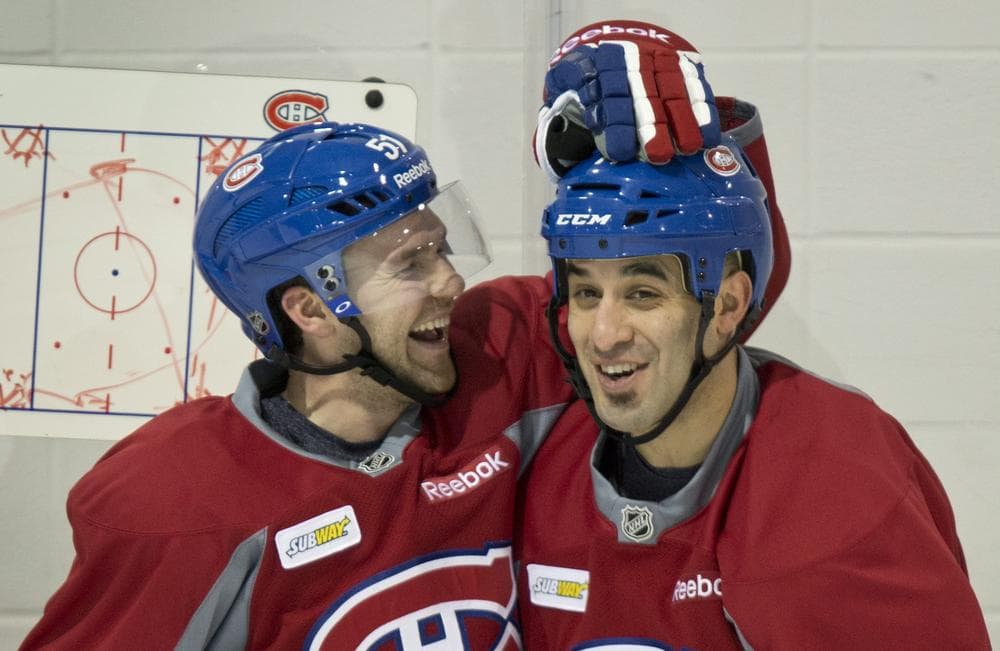Advertisement
In Depth
Elliott: Too Soon To Declare Winners In NHL CBA; Kings Primed To Repeat
Resume
Who won and who lost in the NHL labor struggle? And what happens to the rest of the season? Bill Littlefield spoke with Only A Game hockey analyst Helene Elliot, who covers the NHL for the Los Angeles Times.
BH: Helene, can the owners look in the mirror now and say, "Based on the changes in the collective bargaining agreement, the lockout turned out to be a good move"?
HE: That’s something that we really have to wait and see, I think. I mean, they can look in the mirror and say, “Gee, I’m rich and I’m going to get richer,” because I think that’s what they all want to be saying when they look in the mirror.
The last collective bargaining agreement everybody thought was a decisive victory for the owners, and as it turned out, it took about five minutes for teams to find all these loopholes where they could give out these long term, front-loaded contracts. So, I’m sure there are people sitting there and using magnifying glasses and whatever means they can to find loopholes in this new agreement, too.
BL: Among those arguing that "the owners won the tussle" is Webster University economics professor Patrick Rishe. You're not going to argue about money matters with an economics professor, are you?
HE: Especially given my grades in math, I shouldn’t, but I beg to differ. I know Patrick and I respect him enormously, but I think that you really need to see how this plays out over time. I think we need to see how the revenues grow, too, and how the revenue sharing works. Will it be enough to prop up some of the small-market teams that need it?
[sidebar title="Slap Shot Turns 35" width="630" align="right"]During the NHL lockout, Only A Game continued to deliver serious hockey coverage, including Doug Tribou's story on the 35th anniversary of the Paul Newman hockey comedy Slap Shot. (And yes, he talked to the Hansons.)[/sidebar]You’re going to have a lower salary cap, which also means a lower salary floor, and that was a big issue for a lot of teams. Some of the smaller-market teams were obligated to spend more than they really wanted to, just to meet the minimum. The Islanders, for example, had to pad up on some contracts that they didn’t really need, just to get to that floor. And the mechanisms are going to change a little bit this time, and I think you need to see it in effect for a year or two to really get a good reading on it.
BL: A lot of NHL players played in Europe, Russia, England, Alaska and elsewhere during the lockout, but obviously they were not playing with their NHL teammates. What do you anticipate regarding the level of play when the butchered season begins?
HE: Well, it’s interesting because I was talking to some members of the Ducks the other day and some members of the Kings as well, and the guys who played in Europe [and] all [of them] said that they were glad they did it. So I think the teams with guys who did play, whether it was in Europe or in the ECHL, I think that they might have a little bit of an advantage coming out of the gate.
BL: Is it possible to say at this point which teams are best prepared to come out of a very short training camp ready to prevail?
HE: The Kings. They’ve brought back every single player from their [Stanley] Cup-winning team, and when you look back a couple years ago to the Chicago Blackhawks, I think they lost 10 or 12 guys off their team between the time they won and the victory parade. So the Kings may come out with a little bit of an advantage because it is all the same players, but you could also say that some of the teams in their conference got better. I mean, Minnesota added Zach Parise and Ryan Suter. So maybe standing still isn’t good on a talent level, but from a familiarity standpoint, it could very well help them.
BH: Well, familiarity counts. This season is going to be awfully short before people are thinking about the playoffs.
HE: Absolutely, and I was talking to Darryl Sutter, the Kings coach, and he is the only current NHL coach who also coached that 48-game season in 1994-95. And he was saying the key is really going to be depth. That season, the Blackhawks went through 21 forwards, nine defensemen, and three goaltenders. So the teams that have some depth and some versatility are really going to have an advantage, I think.
BL: I have saved what may be the most significant question for last: Once the season begins, will fans attend and watch games and buy jerseys and stuff, as if the owners had never locked the players out?
HE: You know, that’s what I’m really wondering about because I’ve heard from so many people who said,” I’m not going back, I’m fed up, I’m though with this.” But now, the last couple days, they’re saying, “You know what? I’m kind of softening.”
And you know what? The problem is, as those of us who love hockey so well, the game is best experienced in person. You just don’t get the same feeling, and the sense of the speed and the strategy and everything unfolding, when you’re watching on TV. So hockey has that in its favor, in a sense – that it knows that the real fans are going to want to be there. So they may go to the games, but they may make their protests at the cash register at the team store.
This segment aired on January 12, 2013.